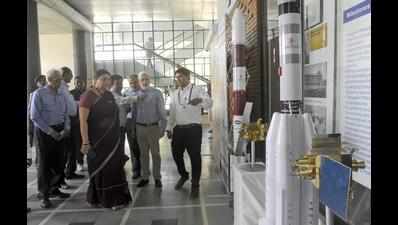- News
- City News
- ahmedabad News
- ATIRA-made composites to lighten Isro satellites
Trending
This story is from June 5, 2018
ATIRA-made composites to lighten Isro satellites

Smriti Irani inaugurated the Vacuum Assisted Resin Infusion Centre (VARIC) on Monday
AHMEDABAD: Soon, satellites launched by the Indian Space Research Organization (Isro) will be significantly lighter, as several metal parts will soon be replaced by composite textiles, manufactured by the Ahmedabad Textile Industry Research Association (ATIRA).
Union minister of textiles, Smriti Irani, on Monday, inaugurated the Vacuum Assisted Resin Infusion Centre (VARIC), which will manufacture these spacecraft parts using carbon composites.
R M Sankar, assistant director of ATIRA, said, “VARIC has been established with a Union government grant of Rs 25 crore, to manufacture carbon composites. Carbon fabric is infused with polymer resin, to give high durability. These composites are light, have high heat resistance and durability and are suitable for space applications.”
According to experts at ATIRA, replacing metal parts of satellites with composites will bring down weight significantly. This in turn helps cut launch costs.
Irani said, “ATIRA has been instrumental in furthering the Union ministry of textiles’ vision to improving fabrics to create a better finished product and make India a global hub of technical textiles.”
Scientists at ATIRA have so far designed parts such as reflectors, the outer cover of the satellite, feed horn and camera structure. This has already been done for GSAT-VI, X and XI and Chandrayaan, said Sankar.
“Currently, Isro had provided a list of 26 satellite parts that can be made using carbon composites. We’re exploring possibilities on how many are feasible,” he added.
Irani also inaugurated the Materials and Product Innovation Centre (MAPIC), which has been established after a memorandum of understanding was inked between the National Institute of Design (NID) and ATIRA, to encourage collaborative multi-disciplinary R&D work at the national level.
Union minister of textiles, Smriti Irani, on Monday, inaugurated the Vacuum Assisted Resin Infusion Centre (VARIC), which will manufacture these spacecraft parts using carbon composites.
R M Sankar, assistant director of ATIRA, said, “VARIC has been established with a Union government grant of Rs 25 crore, to manufacture carbon composites. Carbon fabric is infused with polymer resin, to give high durability. These composites are light, have high heat resistance and durability and are suitable for space applications.”
According to experts at ATIRA, replacing metal parts of satellites with composites will bring down weight significantly. This in turn helps cut launch costs.
“A satellite cost roughly Rs 500 crore. Of this, 80% is the cost of electronic components while 20% is structural expenses. We can help reduce the latter. Reducing every kilogram of satellite weight brings down the launch costs by Rs 10-15 lakh per unit,” said Dr T Gangopadhyay, deputy director (composites) at ATIRA.
Irani said, “ATIRA has been instrumental in furthering the Union ministry of textiles’ vision to improving fabrics to create a better finished product and make India a global hub of technical textiles.”
Scientists at ATIRA have so far designed parts such as reflectors, the outer cover of the satellite, feed horn and camera structure. This has already been done for GSAT-VI, X and XI and Chandrayaan, said Sankar.
“Currently, Isro had provided a list of 26 satellite parts that can be made using carbon composites. We’re exploring possibilities on how many are feasible,” he added.
Irani also inaugurated the Materials and Product Innovation Centre (MAPIC), which has been established after a memorandum of understanding was inked between the National Institute of Design (NID) and ATIRA, to encourage collaborative multi-disciplinary R&D work at the national level.
End of Article
FOLLOW US ON SOCIAL MEDIA










